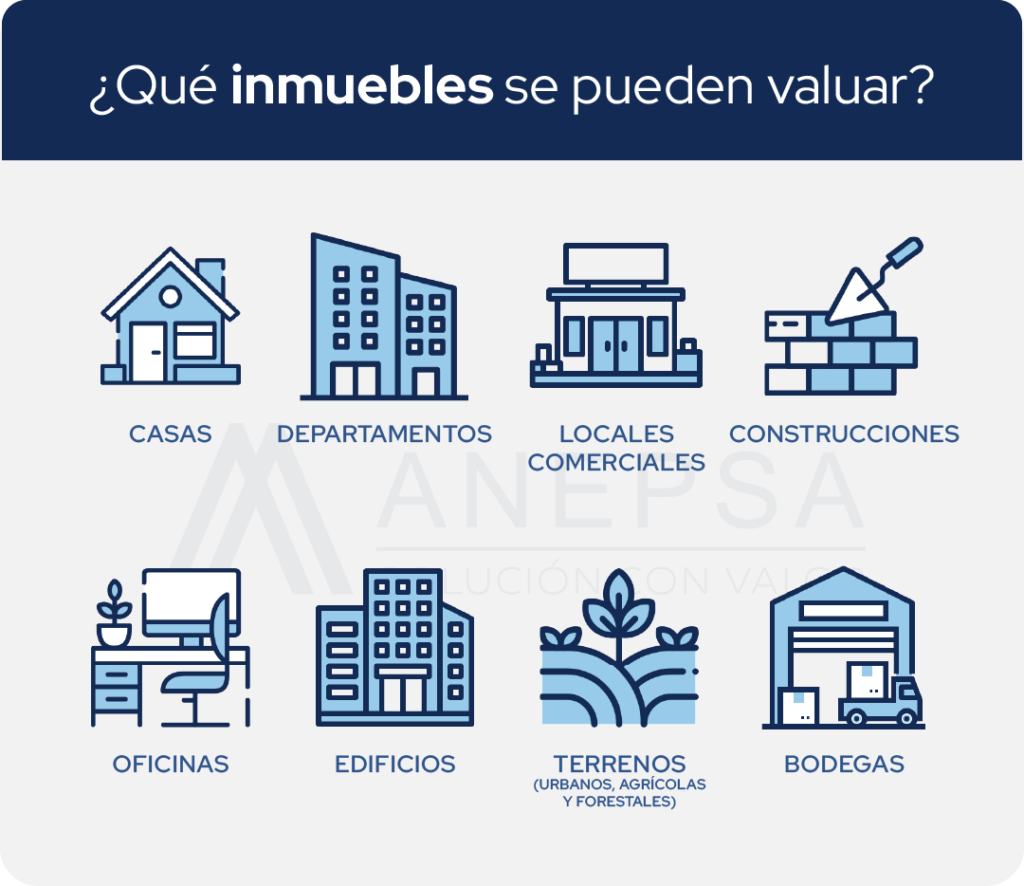Real Estate Appraisals
Real Estate Appraisals
index

A appraisal real estate is a report technical elaborated by a appraiser professional, whose purpose is estimate he worth of market of a property. This estimate HE bases in factors as the location, characteristics physical, state of conservation and conditions of the market.
This document is fundamental for decisions of investment, financing, management of assets, insurance, mergers and acquisitions, between others applications international.
Benefits of a Real Estate Appraisal
- Transactions safe: Provides a base objective for establish prices righteous of buys either sale.
- Access to credit: Is required by entities financial for support mortgages and others loans guaranteed by estate estate.
- Management of assets: Facilita the administration efficient of the portfolio real estate of companies and investors individual.
- Coverages of insurance: Determines he amount insured necessary for cover possible losses.
Types of real estate appraisals
Appraisal mortgage: For support loans through the warranty of a property.
Appraisal for trading: HE uses in talks of acquisition either sale for establish a price of reference reliable.
Estimate preliminary (opinion of market): Analysis fast that It allows guide decisions without require a report complete.
Appraisal of profitability: Esteem he performance potential of a property leased.
Appraisal for insurance: Define he cost of replacement in view of accidents, taking in account materials, hand of construction site and location.
Appraisal legal either notarial: Required in processes legal of transfer, inheritances either disputes contractual.
Appraisal administrative either fiscal: Used for determine bases taxable in taxes about estate, of agreement with authorities locals.
Appraisal by acquisition forced: Apply in processes of buys forced by part of governments either corporations for development of infrastructure.
Appraisal with approach of development: Consider he potential constructive either town future of the land.

Methods applied in a Real Estate Appraisal
The methods commonly accepted in he scope international include:
Method of the cost: Based in he worth of replacement of the property, less depreciation.
Method comparative (of market): Compare he good with properties similar that they have been sold recently.
Method of income: Esteem he worth according to the flows of cash futures that he property can trigger (common in properties commercials).
Which properties are included in a Real Estate Appraisal?

Regulations and Standards by Country in a Real Estate Appraisal
1. Mexico
- In Mexico, property appraisals are regulated mainly by the General Law on National Assets and the Appraisal Standards published in he Diary Official of the Federation (DOF)Local regulations in each state are also taken into account.
- The appraisal must be carried out by a certified appraiser by the Mexican Valuation Society (SMV), and must include a detailed description of the property, the cadastral value, the market value, and, if necessary, the conditions of the real estate market.
- The type of construction, age, state of preservation, location, capital gains, and market comparables are considered.
2. USA
- In the United States, real estate appraisals are primarily regulated by the Uniform Standards of Professional Appraisal Practice (USPAP)), which are guidelines issued by the Appraisal FoundationIt is important to mention that these must be updated every two years, it is mandatory for licensed appraisers.
- The Federal Housing Administration (FHA) has regulations for certain types of financing.
- Appraisals must be performed by a Certified Real EstateProperty values are based on market comparables (recent sales), the property's physical condition, its location, and other local market factors.
- Factors to consider include a comparison of recent sales, replacement cost, and the property's profitability. Zoning and local land-use regulations are also taken into account.
3. Argentina
- In Argentina, real estate appraisals are regulated mainly by the Civil and Commercial Code of the Nation, as well as provincial professional associations such as the Professional Council of Surveying, Architecture and Engineering or the College of Public Auctioneers.
- Appraisals must be carried out by qualified and registered appraisers, such as those that form part of the Argentine Federation of Real Estate Appraisal Entities (FAEVY).
- The criteria to be followed include a detailed description of the property, its market value, cadastral value, and its relationship to the economic and local context. In addition, consideration is given to the type of construction, age, state of repair, location, and comparable market values.
4. Colombia
In Colombia, the appraisal of real estate is regulated by the Law 1673 of 2013, which supervises the appraiser's activity. As well as el Open Registry of Appraisers (RAA).
- Appraisals must conform to the International Valuation Standards (IVS) when the assignment requires it.
To carry out an appraisal, it is necessary that the expert appraiser be certified by the Superintendency of Notaries and Registry.
The appraisal must detail the property's description, assessed value, market value, and tax value. It also takes into account the property's location, physical condition, age, local real estate market conditions, and comparable property values.
5. Chile
In Chile, appraisals are regulated under the Law 18.795 on the real estate system and the Law 19.537 on horizontal property. As well as the Chilean Standard NCh 430 and the Regulations of the Ministry of Housing and Urban Development (MINVU).
- Urban and cadastral valuation falls on municipalities and the Internal Revenue Service (SII).
Appraisals must be carried out by licensed appraisers, who must follow the guidelines of the College of Appraisers of Chile.
A property appraisal must consider aspects such as its construction type, age, state of repair, location, market value, and capital gains. Comparable properties and local market conditions are also analyzed.
6. Peru
In Peru, the appraisal of real estate is regulated by the Law No. 28,923 on cadastre and the Law No. 28,243 on real estate appraisal. As well as the National Appraisal Regulation (RNT) under the Ministry of Housing, Construction and Sanitation.
The appraisal must be carried out by a accredited and registered appraiser before the National Superintendence of State Assets (SBN). They can also carry out appraisals engineers, architects or certified appraisal professionals.
The appraisal is based on criteria such as location, type of construction, age, state of repair, market comparables, and the property's cadastral value. The evolution of the real estate market and demand in the area are also considered.
7. Ecuador
In Ecuador, property appraisals are regulated by the Urban Cadastre and Appraisal Law. As well as by the Municipal Regime Law and various technical standards from entities such as the Military Geographic Institute (IGM) and the Technical Secretariat of Habitat and Housing.
- Some appraisals must be adjusted to the International Valuation Standards (IVS) for certain processes such as expropriations, planning or corporate appraisals.
A property appraisal should include a detailed description of the property, its market value, its assessed value, and local market conditions. The building's age, type of construction, state of repair, and comparable properties in the area are all taken into account.
8. Costa Rica
In Costa Rica, appraisals are governed by the Law No. 8,736 of Cadastre and the Regulations of the Cadastre Law. As well as by the National Appraisal Regulations (RNA), which is the main technical framework for public entities. The National Geographic Institute (IGN) and the Treasury intervene for fiscal or technical purposes.
Experts must be registered members of the College of Engineers and Architects of Costa RicaThere are also other qualified professionals such as surveyors or civil engineers, depending on the type of property and the specific regulations.
The appraisal process must detail the property's characteristics, including market, cadastral, and tax values. Also considered are the property's age, type of construction, state of repair, location, and comparable properties within the local market.
9. Uruguay
In Uruguay, appraisals are regulated by the Law No. 18,308 of cadastre and the General Tax Directorate (DGI), which establishes the tax parameters for the valuation of real estate.
Appraisals must be carried out by qualified appraisers, and must include a detailed description of the property, its market value and the cadastral value.
Factors to consider include age, type of construction, state of repair, location, and comparable property values in the area.
10. Paraguay
In Paraguay, appraisals are regulated by the Law No. 1,092/97 on Cadastre and the General Directorate of Public Registries.
Appraisals must be carried out by certified professional appraisers, who must include in the report a description of the property, the market value, the cadastral value and the fiscal value.
The location, state of preservation, type of construction, age, capital gains, and values of similar properties in the same area are considered.
International Appraisal Standards
For guarantee uniformity, reliability and acceptance global, the appraisals HE they perform low frames normative recognized as:
International Valuation Standards (IVS): Issued by he International Valuation Standards Council, are widely adopted by professionals in further of 100 countries.
Royal Institution of Chartered Surveyors (RICS – Grid Book): Recognized globally as a reference in hello good practices of appraisal and ethics professional.
Uniform Standards of Professional Appraisal Practice (USPAP): Current mostly in States Joined, establish rules techniques and ethics of application in multiple jurisdictions.



